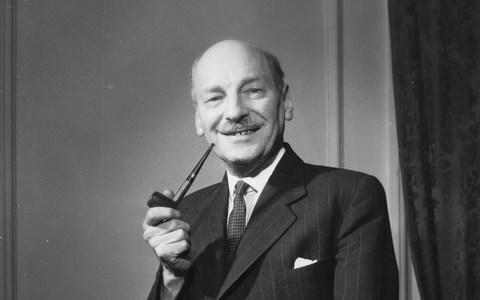Keeley Hawes WW2 drama claims US recruited British civil servants to root out communists

After the high octane twists of Bodyguard, a drama about the workings of the civil service may sound dull by comparison.
But Traitors, starring Keeley Hawes in her first role since playing Bodyguard’s Home Secretary Julia Montague, is a political period thriller which makes the startling claim that British staff in Whitehall were spying on their own government after being recruited by US intelligence agents.
Based on “deep research”, the Channel 4 and Netflix series explores the secret workings of the Office of Strategic Services (OSS), the forerunner to the CIA.
It is set in 1945, and suggests that US agents were concerned that “Whitehall has been infiltrated by communists” who would thrive under Clement Attlee’s government.
Emma Appleton plays Fiona ‘Feef’ Symonds, a privileged young Tory who trains to join the Special Operations Executive and is disappointed when the war’s end curtails her adventure.
She is recruited by an agent (Michael Stuhlbarg) to work in the Civil Service and root out communist sympathisers. It is a rogue operation, after President Truman disbanded the OSS in 1945. Hawes plays Feef’s superior in Whitehall.

The scriptwriter, Bash Doran, was asked at the series launch whether she had proof that British civil servants spied on their own government.
“I did some fairly deep research into the history of the CIA, and I talked to a bunch of spies, and what I have been assured is: there is no reason to think that there wasn’t,” she said.
“Although the OSS disbanded, there were people who were committed to keeping it going until the president could be convinced there was an actual need.
“We have done an unfathomable amount of historical research. The circumstances that our character come from are absolutely based on history and fact.” She added that Stuhlbarg’s character is a “composite” of real-life figures.
Appleton, 27, in her first starring role, said of the storyline: “The way the US recruited British people to spy for them wasn’t by saying, ‘We want you to spy on your government and be a traitor.’ It’s proposed to her as, ‘This is the right thing to do for your country. You are protecting Britain from a Soviet threat that could be absolutely horrifying and damaging.’
“It’s almost pitched as, ‘We’re the guys who saved the world!’ And who would say no to that?”

Hawes said making the series had opened her eyes to the work of the Civil Service. “They created the benefits system. They created national insurance. And these are people with no computers. These are people with a paper shortage, and a pencil shortage. It’s literally pen and paper, and people created it, a sort of human computer. They built it from the ground up.
“It’s something now we take for granted and it wasn’t that long ago, not really. All of that is fascinating to me and wonderful that they did it,” she said.
“This isn’t a story that’s been told before. This something really new and really fresh and really thrilling.”
Doran said she was inspired to write a drama about “England and Englishness” after an incident at Waterloo station. She moved to the US in 2000, where she wrote for HBO’s Boardwalk Empire, and on a return visit to London “I couldn’t figure out how to use the ticket machines at Waterloo, which is a small thing but it felt very very big at the time, to the point where I had a little breakdown and embarrassed commuters and myself.
“What was going on was that I realised for the first time that I’d officially left and that I wasn’t from England any more and I was a stranger… This was good news because it meant I had something to write about. I had an emotion that I thought would be useful.”
The Civil Service setting came later, and Doran said: “The thing that really appealed to me about the Civil Service is that it’s a place for eccentric people. It’s a place that has tremendous tolerance for kookiness so long as you’re extremely intelligent.”

 Yahoo News
Yahoo News 